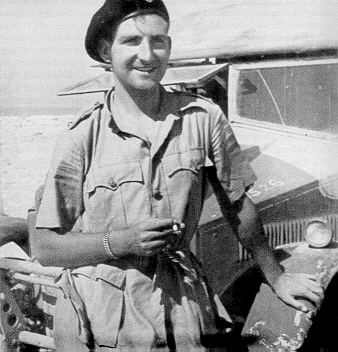Keith
Douglas was born in Kent, and educated at Oxford University under the
tutorship of poet Edward Blunden, before enlisting with the British Army
when World War II broke out. He is the most famous English poet of that
war, although he began publishing his work at the age of 16. His verse is
precise, unsentimental and at times chilling, in its treatment of desire
and sexuality as well as in its pervasive obsession with death and the
relation of death to writing. Douglas was killed in Normandy, having also
written about his involvement in the war in North Africa, his slim but
intensely powerful corpus concluded at an early age. His work began to
receive the acclaim it deserves only when Ted Hughes, a great admirer,
edited and introduced a collection in 1964 (Selected Poems). See also the
more recent Complete Poems (ed. Desmond Graham; 1978).
Bloomsbury Dictionary of English Literature,
|
|
